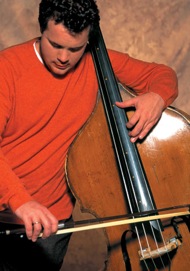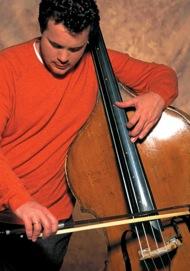
His double bass has spoken in many different musical languages, and that hasn’t kept 50-year-old Edgar Meyer from getting clearly heard as one of the most talented, innovative, and knowledgeable virtuosos of the big strings, as well as a composer, collaborator, and educator of choice. His Appalachia Waltz album (Sony Records) placed him and classically trained but genre-hopping Yo-Yo Ma and Mark O’Connor atop the U.S. pop charts for 16 weeks in 1997. Meyer has been rewarded with an Avery Fisher Career Grant (the first for a bassist), a MacArthur Foundation Award, and three Grammies. His rare solo appearance at the Herbst Theatre on May 14 will include the premiere of a new commission from San Francisco Performances, as well as a selection from his recorded transcription of the Bach Cello Suites (Sony, 2000), and other material. He took a break from practicing to share some personal history, philosophy, and pedagogy with SFCV.
Edgar, where is this phone call reaching you?
I’m at home in Nashville, which is where I’ll be till I come out to San Francisco. It’s just a nice residential neighborhood, and we’re set up pretty well: At one end of the house, my wife can practice, my son can practice in another place, and I’ve got a music room in another place. So we can all three kind of coexist. But my wife is actually out of town playing a concert, and doesn’t get back till late.
Do you get to perform together?
Not that often. My son, George, has played on a few shows; he’s done encores. He’s a senior at the University High School of Nashville. My wife is Connie (or Cornelia), Heard, and she teaches at Vanderbilt and Aspen and plays in the Blair String Quartet. They both play violin.
When I was listening to your duo album with bluegrass mandolinist Chris Thile [Nonesuch, 2008], I realized I’d need to check the pronunciation of both your surnames.
Mine is My-er. Chris pronounces his Thee-lee. It’s not like the German, it’s what his father used.
Featured Video
Buy Tickets
Edgar Meyer, Double Bass
Venue: Marines Memorial TheaterCity: San Francisco
Date: May 14, 2011 8:00pm
Price Range: $60/$50/$35
And I noticed that you and Chris also have in common that both your dads were bassists.
Yes, it’s a very strong bond, actually. And it’s also the type of men they were: They were both devoted to their families. And they were very natural musicians. My dad’s name was the same as mine: I use “Jr.” on and off.
What kind of music was he coming from?
Jazz and classical, pretty much. His mother died when he was 8; she’d been from the city and she played classical music, so he had that sound in his head, though he grew up on a farm. But in his teenage years, he got excited about bebop, and he and his brother both played bass in different jazz bands. When he was 24 or 25, he went back to school and learned how to read music and use a bow. So he was quite obsessed, when I started, that those be the first things I learn how to do. He died when I was quite young.
Did you get a lot of classical training?
Yes and no. I did not really do much in terms of composition in college [at Indiana University]. The closest I’ve come to the classics is spending most of my life with the piano music and scores of my favorite composers.
You’ve transcribed Bach’s Cello Suites; what else classical has impressed you?
The short list is gonna be Beethoven and Mozart and Haydn. On my piano right now are Bartók and Debussy and Beethoven’s Complete Variations [the Dover edition]. When I was in college, I realized there were two reasons I was in music: one was 18th- and 19th-century classical music, and the other was the music of our time, which in my case turned out to be jazz and bluegrass.
Is there evidence in your own compositions of your influences?
I don’t know whether you’d find jazz an obvious element, but you might. But I’ve been doing a regular trio for the last few years with [eclectic banjoist] Béla Fleck and [Indian-born tabla player] Zakir Hussain, who’s from San Anselmo [on record as The Melody of Rhythm, E1 Music, 2009]. I don’t know whether Zakir would say he hears any “Zakir” in my composition, but I just learned a lot from him: His integration of melody and rhythm is something I had not really seen anything like before, and that has some influence on some of my figures.
A fascinating variety of people have received compositions from you, including Joshua Bell, the Emerson String Quartet, and Hilary Hahn. Were they different voices which you had to write for differently?
Absolutely, though I will say that, now that I’ve been doing it for 20 or 30 years, I’ve had pieces written for one voice, interpreted by another. The most striking examples are the duets I wrote for Joshua Bell and myself, which I’m very fond of. But Chris Thile came and played them with me and completely redefined them.
Different interpretations?
Well, Josh is a classical violinist, and the violin is a more expressive instrument, in that it has sustain and control of pitch. So that played into Josh’s version. Chris is someone who understands rhythm at a very uncanny level, so he was able to take the first movement of that concert duo and add a lot of different types of syncopation, but make it very simple. ... I would say the average classical musician doesn’t always appreciate the vast differences in rhythms.
I’m fond of bluegrass, and write about it for Songlines world music magazine, and I’m curious about what else you’ve found in that American genre. Aside from bass, you’ve performed on banjo, mandolin, dobro, fiddle, guitar, and piano.
I certainly fell in with it early, when I was a teenager, and I’ve spent over half my life with some of the iconic bluegrass figures of my generation. I think it’s true that if people play instruments, there’s some part of it that’s mechanical, and there’s some part which is expressive. With [bluegrass dobro player] Jerry Douglas, [the expressive] is a higher percentage than with other people. He got a lot of this from bluegrass and country vocalists, where the expression is very different [from other song forms]. The fact that it’s expressive isn’t unique, but the way it is is probably unique to bluegrass.
Now I’ll put on my jazz journalist’s hat. In jazz, the bass has special status, in that it’s called upon for both solid rhythmic work and melodic work in solos, including improvisation. Do you like playing both bases?
Yeah, and within and outside of jazz, sometimes the bass player can end up being the bridge between the drummer and the other musicians. What you said is exactly right, but it all depends on the chemistry of the band. Playing with Béla and Zakir, it’s usually more of either a rhythmic function or a melodic function. But playing alone, one has to generally be doing both at once. The Bach Suites do that at the highest level, but that’s part of what makes them challenging to play, having to really create both the frame and the covering, if you will.
You’ve appeared in the San Francisco Performances series before, in classical company, with pianist Amy Dorfman. But this month, you’ll be on stage alone. Is that new?
It’s really new for me; this will be the third time I’ve ever played alone.
Though your recording of the Bach was solo.
And occasionally I’ll record an unaccompanied piece in the middle of some other music. But I’ve never written a more ambitious, completely composed piece like this commission from San Francisco Performances and the Savanna Festival. I’m calling it Work In Progress, and at this point it’s a 20-minute version, with the outer movements pretty well locked in. They’re fairly rhythmic, and fairly long-line. I’ll play the first Bach Suite in the first half [at Herbst], along with this composed commissioned piece. The second half will be slightly less formal, and will be announced from the stage: primarily shorter original pieces, with some improvising.
Getting back to your collaborations, to what degree do you have to change up your technique for different genres? How exotic do you get in your playing?
I don’t! I don’t change up, in general. And I probably don’t fit anything perfectly. I think that’s a bad and a good thing, but I guess if I really thought it was bad, I wouldn’t do it. But looking at it from the other side, I wouldn’t advise a student to do it the way I do it. I’ve had a tendency, instead of taking on predefined roles for the bass, to start from scratch, in terms of either writing or playing with creative individuals, where we don’t have to go with perfectly established roles. And so, that’s a luxury. Whereas, if I’m teaching a bass student, he or she will have to fit into an orchestra and function in a way people have come to expect. And the same would be true in a jazz ensemble. The things I do wouldn’t immediately function in either of those settings. It’s just the voice I’ve chosen on the instrument.
So as a paid professor of double bass, at Vanderbilt [University] and at Curtis [Institute of Music], can you both showcase the unfamiliar paths you’ve followed and teach students what they’ll need to get work?
I think it has to be done that way. I do it, in part, by sharing a class with Hal Robinson, who’s a great principal bass in the Philly Orchestra, so that [the students] can learn that they’re expected to be of a professional quality orchestrally. And they are! At the same time, I’m extremely proud that we’ve fostered a culture, in the Curtis-based class, where our students take a bigger responsibility for what they actually play. Everybody who’s graduating has dipped their fingers into transcribing, if not actually writing, their own pieces, and are taking responsibility for what the actual music is.
So you might be having a benign and vivifying effect on classical music.
I’m happy to push for it, across the board. I’m not a fan of music education becoming 95 percent vocational. I would say it’s more about broadening horizons.

